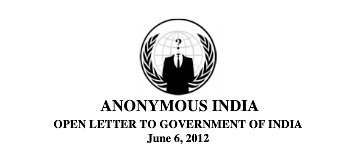
Dear Government of India,
We are Anonymous. It has come to our attention that you have blocked filesharing websites in India. We also know you are in the process of making a Great Indian Firewall, to censor the internet in India. Anonymous believes, however, that pursuing this direction is a sad mistake on your behalf. Not only does it reveal the fact that you do not seem to understand the present-day political and technological reality, we also take this as a serious declaration of war from yourself, the Indian government, to us, Anonymous, the people.
We, the Anonymous are attacking the websites of Government of India, Internet Service Providers with a DDoS attack for past 15 days to spread our message. We would also like to bring to your notice that no content or the data was harmed in this process.
First and foremost, it is important to realize what a DDoS attack exactly is andwhat it means in the contemporary political context. As traditional means of protest (peaceful demonstrations, sit-ins, the blocking of a crossroads or thepicketing of a factory fence) have slowly turned into nothing but an empty,ritualized gesture of discontent over the course of the last century, people havebeen anxiously searching for new ways to pressure politicians and give voice topublic demands in a manner that might actually be able to change things for thebetter.
Anonymous has, for now, found this new way of voicing civil protest in theform of the DDoS, or Distributed Denial of Service, attack. Just as is the casewith traditional forms of protest, we block access to our opponents’ infrastructure to get our message across. Whether or not this infrastructure islocated in the real world or in cyberspace seems completely irrelevant to us. Moreover, we would like to take this opportunity to set the record straight onthe difference between a DDoS attack and hacking, as these concepts oftenseem to be confounded when media and policy-makers talk about Anonymous.Hacking as such is defined by the law as ‘unauthorised access to a computer or network’, whereas a DDoS attack is simply a case of thousands of people making legitimate connections to a publicly accessible web server at the same time, using up the entire bandwidth or processing power of the given server atonce and thereby causing a huge ‘traffic jam’.
It is clear then, that arresting somebody for taking part in a DDoS attack isexactly like arresting somebody for attending a peaceful demonstration in theirhometown. Anonymous believes this right to peacefully protest is one of thefundamental pillars of any democracy and should not be restricted in any way.Moreover, we have noted that similar attacks have also been carried out againstWikileaks itself, yet so far, nobody has been arrested in connection with theseattacks, nor are there even any signs of an investigation into this issue at all.
The HC Madras never issued any list of websites of be blocked, the DoT neverissued a list of websites to be censored. Why is that ISPs are forced to block filesharing websites? Why is that instead of blocking few links the whole domainwas blocked? The blocking of these websites is wrong and unjustified.
Torrents are widely used to distribute open source and free software such aslinux distributions, and many other books and publications that are in the publicdomain. Video hosting sites like Vimeo are used by millions of people everyday. You no longer have access to this content even though it is perfectly legal. Many small – medium businesses use Vimeo to showcase their services andindividuals including filmmakers and designers use it to promote their work. These people are strongly hit by the ban on these websites through no fault of their own.Most of these sites provide a mechanism for illegal and copyrighted content tobe taken down, but the GoI and Indian ISPs decided to bypass this mechanismand block these sites entirely. Few ISPs are blocking contents for their owngood, to hide the scams, to hide their corrupt doings.
We can therefore only assume that these censorships are politically motivated,and were being carried out under pressure from the Government of India. Anonymous can not, and will not, stand idle while this injustice is being done.You can easily arrest individuals, but you cannot arrest an ideology. We areunited by a common objective and we can and WILL cross any borders toachieve that. So our advice to you, the Government of India, is to take thisstatement as a serious warning from the citizens of the world. We will not restuntil all the ISPs unblock the censored websites.
A great man once said “Freedom is my birth right and I shall have it.”
Today, we echo his words. We stand as one. We demand freedom.
Signed,
Anonymous.
We are Anonymous. We do not forgive the denial of basic human rights.
We do not forget those who assist the oppressed.
To the tyrannical government of India … Expect us
From Kafila archives:
- Anonymous, India and the Blackhat Spectacle: Oxblood Ruffin
- “The more they censor the internet the bigger we become” – An interview of Anonymous India
- Unpacking India’s Internet Censorship Debate
- Meet Ashok Kumar the John Doe of India; or The Pirate Autobiography of an Unknown Indian
See also:
- Rebecca MacKinon: The War for India’s Internet
- Jonah Force Hill: India – The New Front Line in the Global Struggle for Internet Freedom

This is indeed an innovative way of protest. Peaceful and legal. Will it be effective too ?
LikeLike
And the Governments response to Anonymous : http://bit.ly/KleqzO spread the word if you like the piece
LikeLike
Using the term “attack” to describe these protests makes them sound
like something nasty, rather than like the democratic protests they
are. I suggest that Anonymous drop the terms “DDOS” and “attack”, and
stick clearly to the terminology of protest.
Also, a request: when you talk about the GNU/Linux system, please
don’t call it “Linux”. See http://www.gnu.org/gnu/the-gnu-project.html.
LikeLike